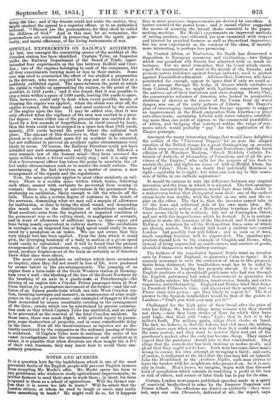OFFICIAL EXPERIMENTS ON RAILWAY ACCIDENTS. AT last, one amongst the
concurring causes of the accident at the Croydon station has been identified. Captain Tyler' an Inspector under the Railway Department of the Board of Trade, super- intended four experiments on the line between Redhill and Croy- don; two of the engines belonging to each of the companies, but all four experiments varying more or less in their nature. Some care wis used to counteract the effect of too studied a preparation in the drivers who were required to stop not at a fixed but at a suddenly exhibited signal. The space between the point at which the signal is visible on approaching the station, to the point of the accident, is 1553 yards ; and it was found, that it was possible to stop a train within a space of 1389 yards, leaving 164 yards to spare. This, however, could only be done when every possible means of stopping the engine was applied; when the steam was shut off, the engine reversed, the break used, and sand scattered by the action of the engine upon the line. It may be added also, that it was only effected when the vigilance of the men was excited in a pecu- liar degree : when either onoof the precautions was omitted or de- layed by a few seconds of forgetfulness, in itself caused by haste, then the train could not be stopped in a space less than 1832 yards, namely, 279 yards beyond the point where the collision took place. The amount of this discovery is, that the signals are so placed as to allow sufficient space for an accident to be executed, but not sufficient to prevent an accident under circumstances very likely to occur. Of course, the Railway Directors could not have intended any such arrangement, and they have only followed a very common law of the human mind—they have assumed the space within which a driver could easily stop ; and it is only now that a Government officer has taken the pains to ascertain the ef- fect under circumstances such as to render the result certain. The ascertaining of the fact involves, as a matter of course, a new arrangement of the signals and the regulations.
Now, the same principle applies to most other accidents on rail- ways. There is a certain space within which trains, following each other, cannot with certainty be prevented from coming in contact; there is a degree of unevenness in the permanent way, producing an oscillation, likely enough to lift the wheels off the rails. There is also a certain degree of rudeness in the minds of the servants, demanding what we may call a margin of allowance for inattention, or time to bring the mind round, and demanding also much order in the distribution of subordinate authority. Most accidents arise from the neglected or impaired condition of the permanent way or the rolling stock, in negligence of servants, and in want of allowance of sufficient space or time—space and tune being nearly equivalent in railway matters. The oscillations in carriages on an impaired line at high speed could easily be mea- sured by a pendulum on an index. We are not aware that this very simple test has been applied. From the data which it could give, the diverging tendency of a body in motion at a given speed could easily be calculated; and it will be found that the present arrangements of the permanent way, coupled with certain rates of speed, produce displacement of the train as certainly as if directors knew what they were about.
The most recent accidents on railways which have occasioned no inquiry, since they did not result in loss of life, were produced by causes latent in the pre-arrangements. The jumping of an engine from a turn-table at the Great Western station at Birming- ham over a wall—the blocking of the line of the Great Northern by the breaking of an axle in a goods-train at Peterborough—the driving of an engine into a Crystal Palace passenger-train at New Cross station by a. premature movement of the former—and the col- lision of an Epsom goods-train which ran into West Croydon sta- tion, breaking carriages and masonry, in consequence of some negli- ence on the part of a ponitsman—are examples of danger to life and limb occasioned by causes essentially existing in the arrangement of the lines; causes which can be ascertained by precise examina- tion such as that which Captain Tyler has instituted, and as easily to be prevented as the renewal of the fatal Croydon accident. In these cases, there was much fright, with private injury to passen- gers, some destruction of property, and in some considerable delay on the lines. Now all the inconveniences or injuries are as dis- tinetly contrived by the companies as the ordinary passing of trains is contrived. If Captain Tyler were to mantilla° the series of his exact investigations into the circumstances of each accideut as it arises, it is possible that when directors are thus taught the A B C Of their own business, they may know how to avoid these san- guinary practice&


























 Previous page
Previous page